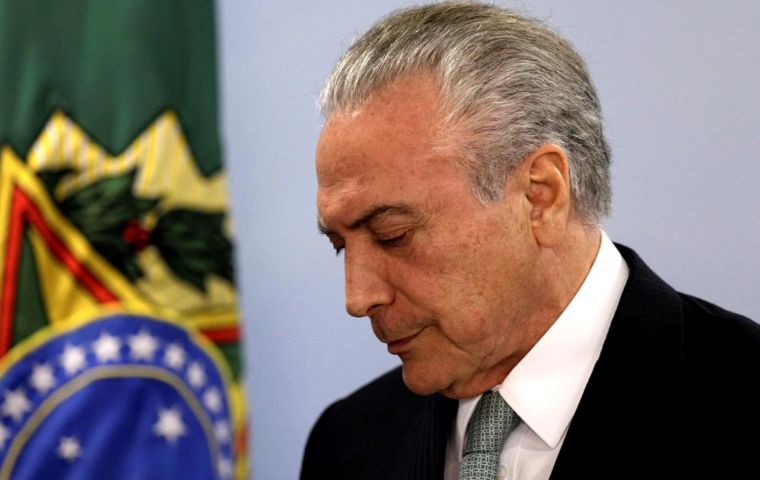MercoPress. South Atlantic News Agency
Temer clashes with Supreme Court over Christmas pardon list that included corruption-related convicts
 Temer drew sharp criticism from prosecutors and on social media with his decree that made rules more generous and included people convicted of corruption crimes.
Temer drew sharp criticism from prosecutors and on social media with his decree that made rules more generous and included people convicted of corruption crimes.  Top prosecutor Raquel Dodge said that the pardons were unconstitutional and threatened a probe into the country’s largest-ever corruption scandal.
Top prosecutor Raquel Dodge said that the pardons were unconstitutional and threatened a probe into the country’s largest-ever corruption scandal. The head of Brazil’s Supreme Court suspended parts of a Christmas decree from President Michel Temer granting pardons to convicted criminals on Thursday, saying Temer’s actions needed further examination by the court. Cármen Lúcia ruled largely in favor of a legal challenge by Brazil’s top prosecutor, Raquel Dodge, who said on Wednesday that the pardons were unconstitutional and threatened a probe into the country’s largest-ever corruption scandal.
The pardons traditionally granted by the Brazilian president around Christmas are applied to criminals meeting certain conditions, including having already served part of their sentence.
But Temer drew sharp criticism from public prosecutors and on social media with his Dec. 21 decree that made the rules more generous and extended them to include people convicted of corruption-related crimes.
Justice Minister Torquato Jardim said on Thursday that the ministry would examine ways to reshuffle the pardons to allow them to go into effect, despite the judge’s ruling.
“The president recommended that we study a way to accommodate those Brazilians who were excluded by the Supreme Court ruling,” he said.
Prosecutor-General Dodge had requested the injunction on Wednesday to stop parts of the decree from going into effect. She said the pardons undermined the separation of powers and would grant impunity to those guilty of graft.
“In her decision, Cármen Lúcia acts as a guardian of the Constitution, underlining the understanding that outside of their humanitarian purpose, pardons cannot be awarded,” Dodge said in a statement after the ruling on Thursday.
A nearly four-year corruption investigation in Brazil, known as Operation Car Wash, has resulted in dozens of powerful business leaders and politicians being jailed for kickbacks, usually involving private enterprises paying billions of dollars in bribes to win contracts with state-run companies.
Temer’s decree ordered that, with some caveats, non-violent, first-time offenders who have already served one-fifth of their sentence are eligible for pardon, compared to one-quarter previously. The decree also eliminated prior terms that barred prisoners with sentences longer than 12 years from being pardoned.
In a newspaper editorial, Jardim wrote that the decree was aimed at pardoning criminals such as the more than 70,000 people jailed for theft and not the 50 or so imprisoned for corruption. Only one of those imprisoned for corruption would likely be eligible for pardon under the decree, he said.




Top Comments
Disclaimer & comment rules-

-

-

Read all commentsThe government - the PT's and now PMDB's - used to claim they were in favor of the Lavajato investigation, while doing all they could, backstage, to sabotage it. Slowly but surely, they have all finally shown their true colours, and no longer even bother to disguise their attacks on the investigation.......can't see the current Congress doing anything in the interest of the people....perhaps it could do the country a favour by doing a “Jim Jones” act...
Dec 29th, 2017 - 08:57 pm 0DT
Dec 30th, 2017 - 06:09 pm 0Probably a larger percentage than before won’t be re-elected, but with a dumb electorate, who knows? Also, wouldn’t count on their replacements being any better, it’s a cultural thing…aren’t flies attracted to shit ?
The ‘A’ class is abt 2 million people…business owners, middle to high management positions...filled by people who, besides being ‘ordinary’, are more qualified ‘n more driven than the rest. Don’t know the proportion btwn office and factory floor workers in a typical industry, but I do know that the latter far outnumbers the former, and usually earns quite a bit less.
Only heinous crimes go to trial by jury…again, based on the education of the average Brazilian, I’d be concerned with their capacity to sit in a jury…it does require a certain level of education, besides a pretty good idea of the country’s reality, to understand ‘n be able to take a responsible decision on their own, without undue influence.
Don’t worry about the plea-bargains, several which led nowhere, or weren’t backed up by proof, have been rejected, and the would-be whistleblowers lost all benefits to reduce their sentences. And, can you imagine needing hundreds of trials by jury, where undoubtedly, many jurors would be prone to bribery ? Once again, don’t forget that Brazil is NOT the UK.
Brazil IS a rich country, but very badly administered. With ‘far less’ corruption and a majority of politicians interested in doing some good for the country and not themselves, benefits would not be anywhere near the burden to the national treasury as they are now. The unemployment rate registered over the last years, with many workers (mainly lower-class) entering the informal sector – and no longer paying into the system – has only aggravated a problem which has been waiting decades to explode.
The GDP/capita comparison gives a good idea of the differences. Today’s current income per capita in Brazil, just goes to show that the great majority (88%) of the population, is C&D class.
Most of the judicial systems in Latin America are the same as yours are they not?
Dec 31st, 2017 - 12:18 pm 0Commenting for this story is now closed.
If you have a Facebook account, become a fan and comment on our Facebook Page!